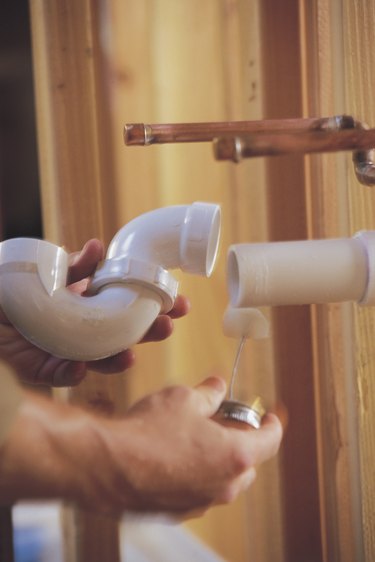Things You'll Need
Adjustable wrench
Marker
Drill
3/4-inch hole saw attachment
Hacksaw or pipe cutting tool
90 degree push-to-fit elbow fittings (4)
Supply pipe

Plumbing supply lines for sinks are usually located on the rear wall under the sink or on the side of the cabinet wall under the sink, though sometimes they're routed through the floor directly under the sink in the center of the vanity or cabinet. Any of these locations is acceptable. If your sink has the plumbing on the rear or side walls, it's possible to move the plumbing to the center of the sink. Moving the plumbing requires cutting the old pipes and rerouting them to the center of the vanity or cabinet. Because sink drains require P-traps to prevent sewer gases from escaping though the drain, sink drains generally cannot be moved.
Preparing the Plumbing
Step 1
Turn the home's main water valve to the off position. The valve is often located in a basement or crawl space. This will shut off the flow of water to all of the plumbing in the house while you work. Open all the faucets in the house to drain as much water from the system as possible.
Video of the Day
Step 2
Go under the sink and place an adjustable wrench around the valves on the hot and cold water lines. Turn the valves counterclockwise to remove them from the supply lines.
Step 3
Measure from the side of the sink to the center of the sink. Measure that distance under the sink on the bottom of the cabinet or vanity and mark two spots separated by two inches. For example, if the center of the sink is 13 inches from the side, measure 13 inches from the underside of the cabinet toward the center of the sink and make two marks 2 inches apart. This is where the two supply lines will come up through the floor of the cabinet.
Step 4
Place a 3/4-inch drill bit over each of the marks on the bottom of the cabinet and bore through the cabinet material. This is where you'll relocate the pipes for the hot and cold water.
Installing New Supply Lines
Step 1
Access the underside of the sink cabinet or vanity where the plumbing is routed. Gain access from a basement or crawl space or by cutting out the baseboard under the sink cabinet if necessary.
Step 2
Cut the hot and cold water lines with a hacksaw or a pipe-cutting tool so there is at least 3 inches of clearance between the pipes and the bottom of the sink cabinet.
Step 3
Place 90 degree compression elbows over the ends of both the hot and cold water lines, with the ends of the fittings pointed toward the center of the sink.
Step 4
Cut two pieces of supply pipe to lengths that reach from the elbows to the holes for the new supply line connections. Press the pipe pieces into the elbow fittings.
Step 5
Press two additional 90 degree elbow fittings onto the ends of the supply pipes.
Step 6
Cut two piece of pipe 5 inches long. Press the pieces though the holes in the center of the sink cabinet and into the elbow fittings.
Step 7
Place the old supply valves over each end of the supply pipes and tighten them with a wrench.
Tip
Have a towel on hand to clean up small spills.
Video of the Day